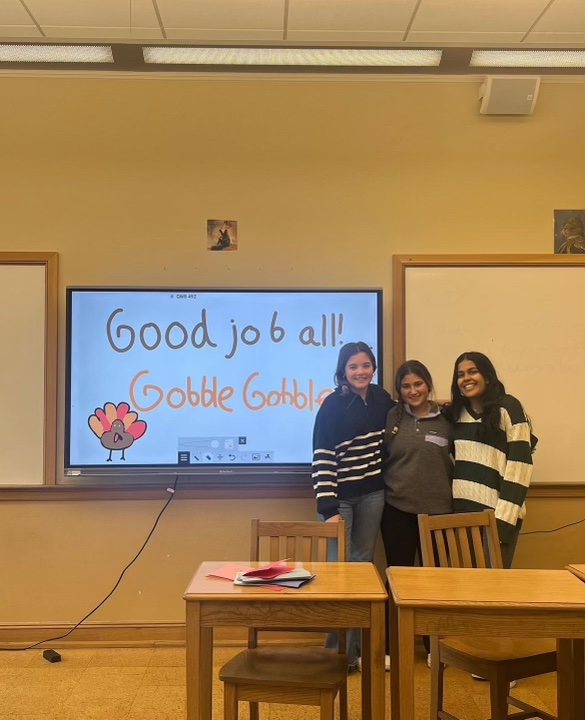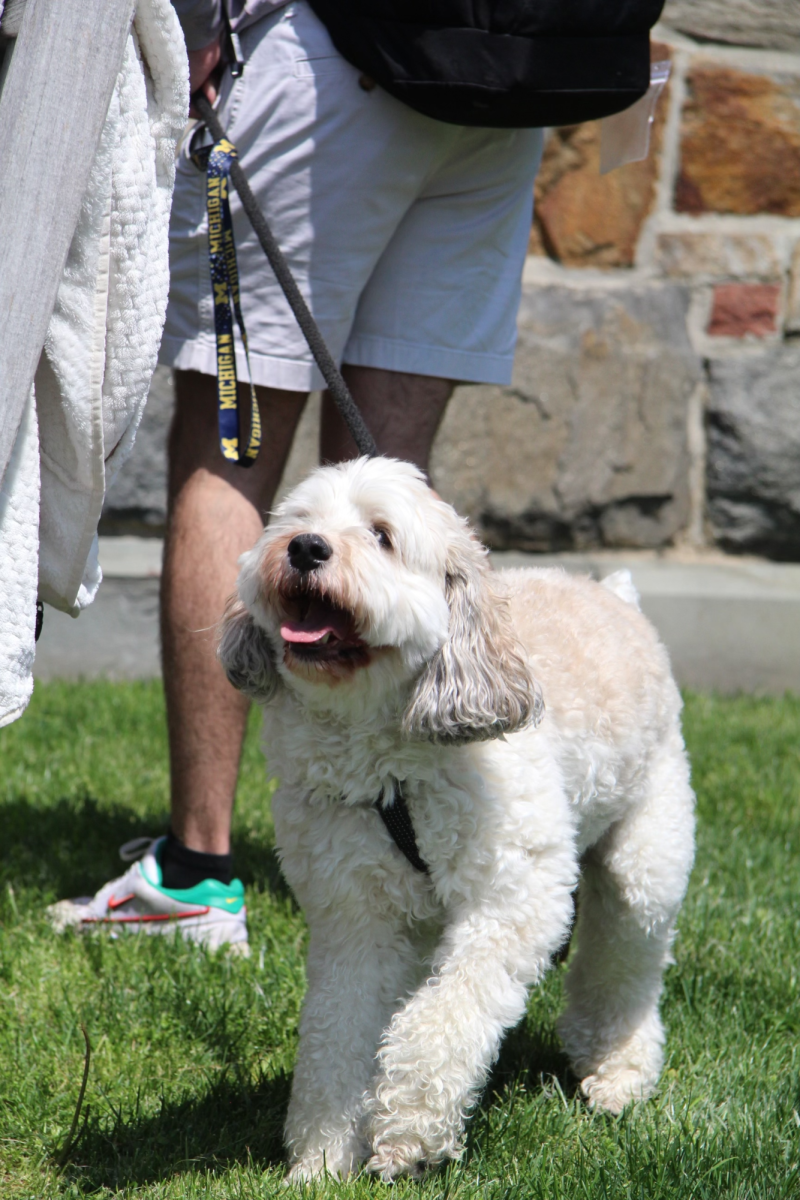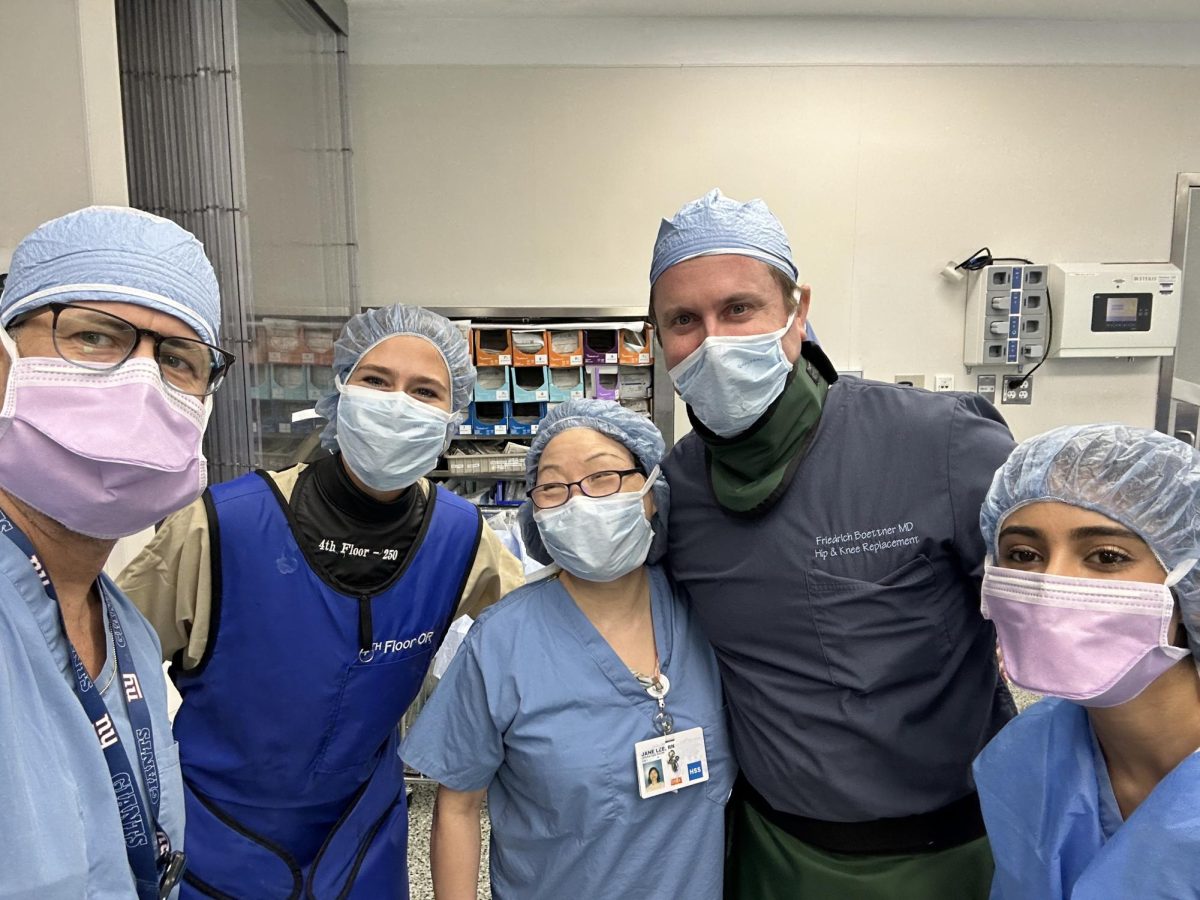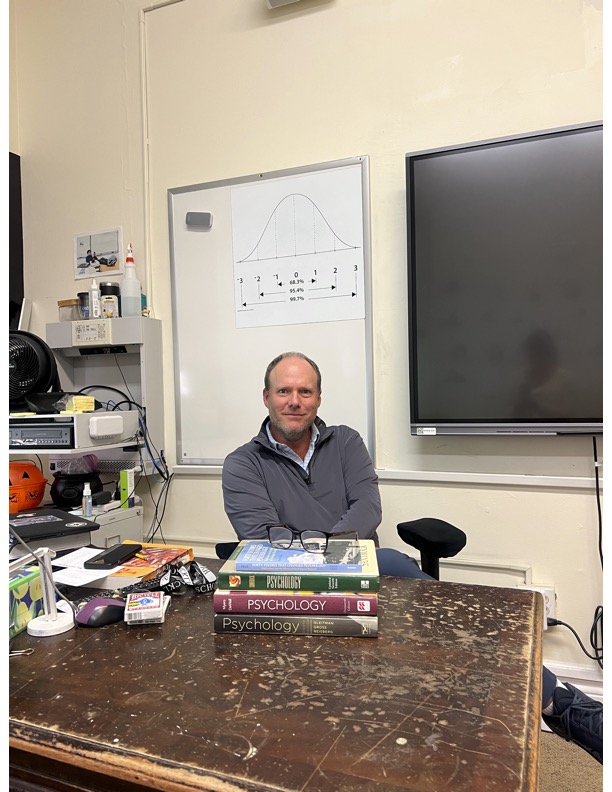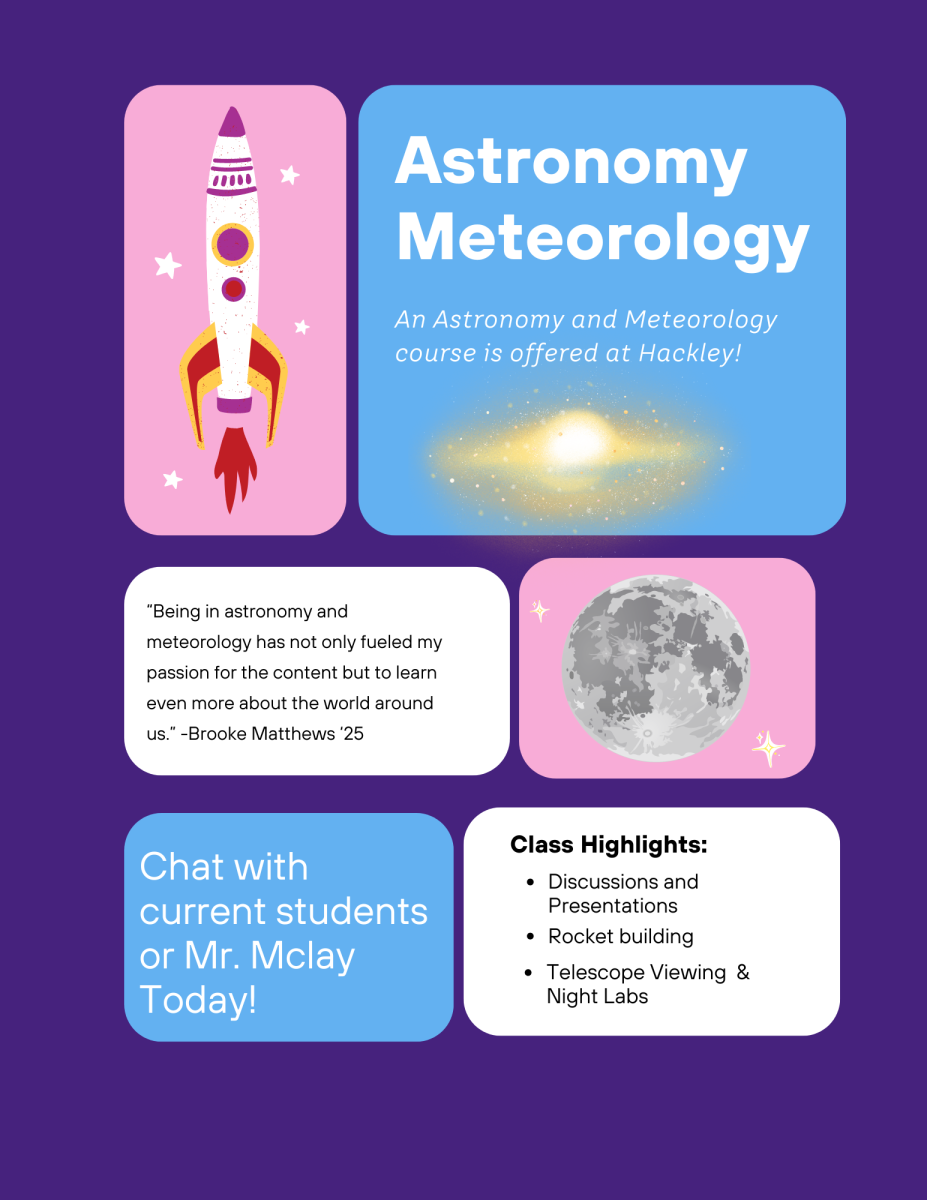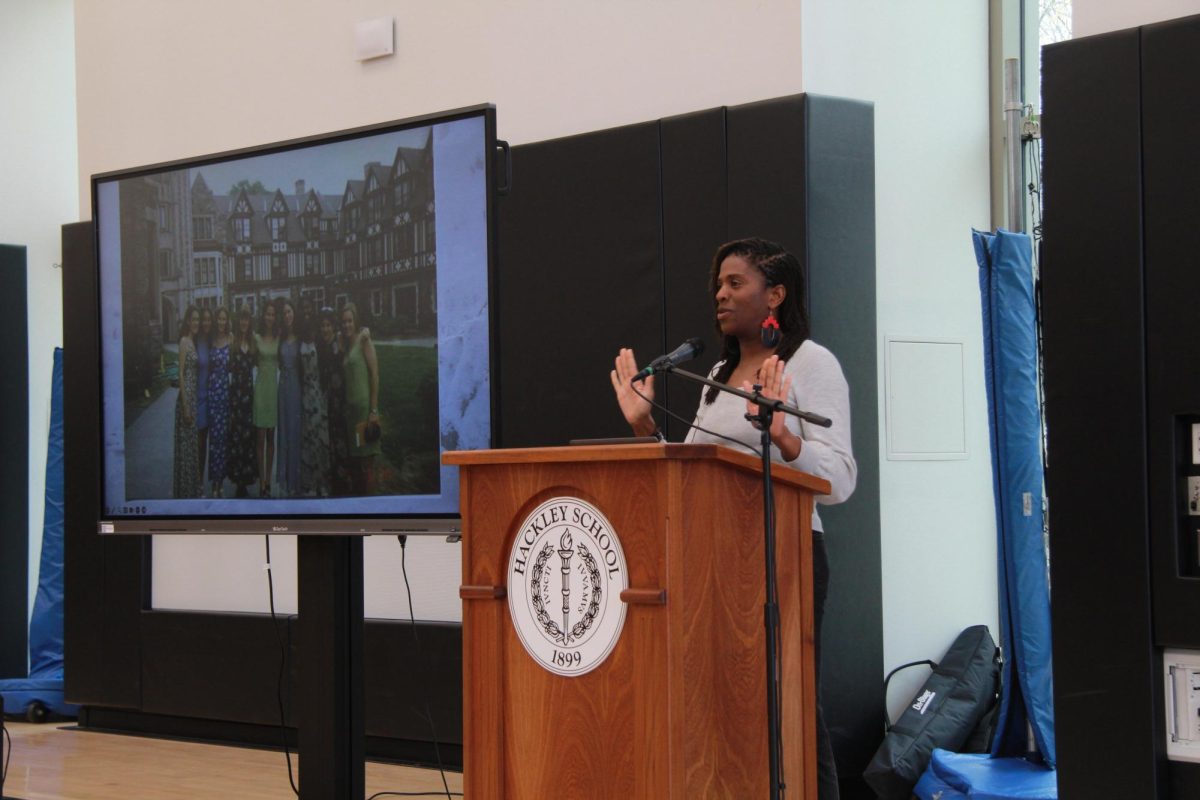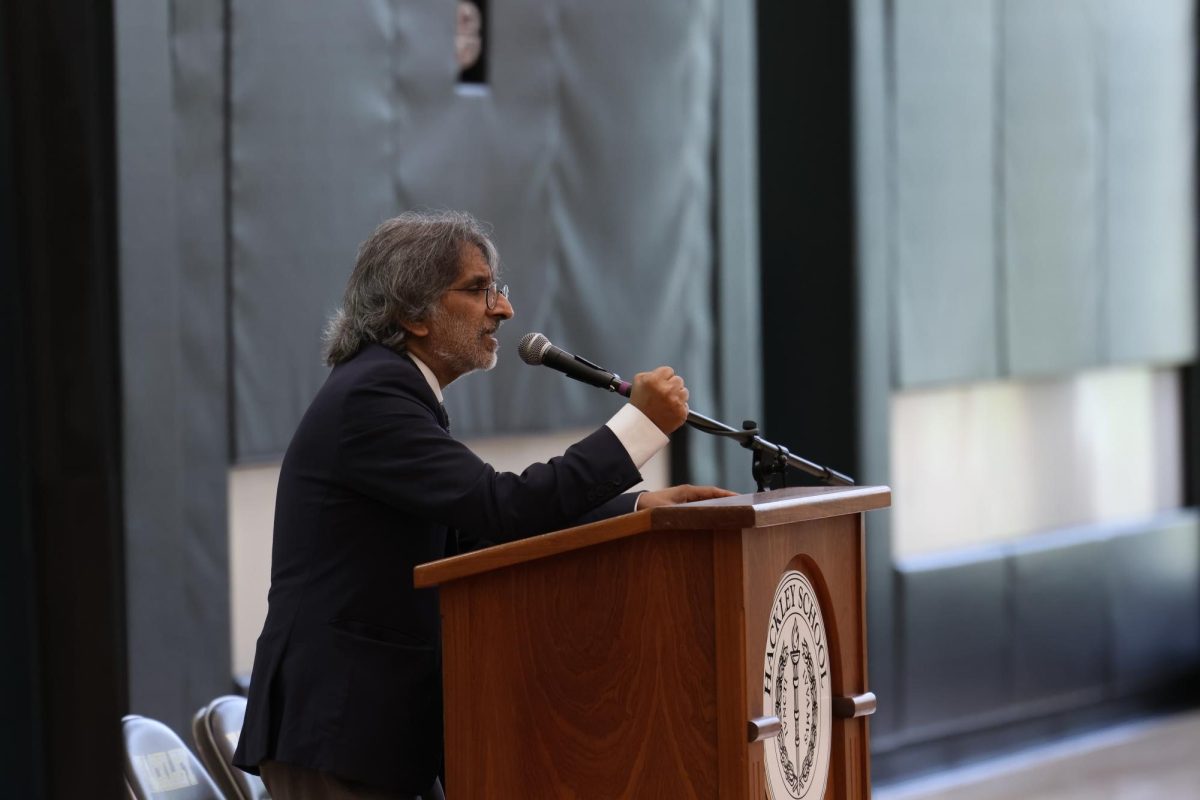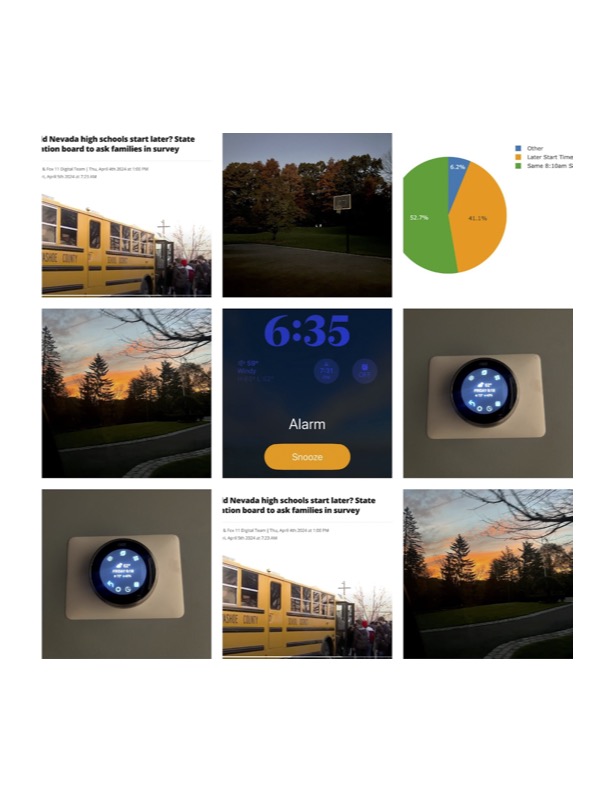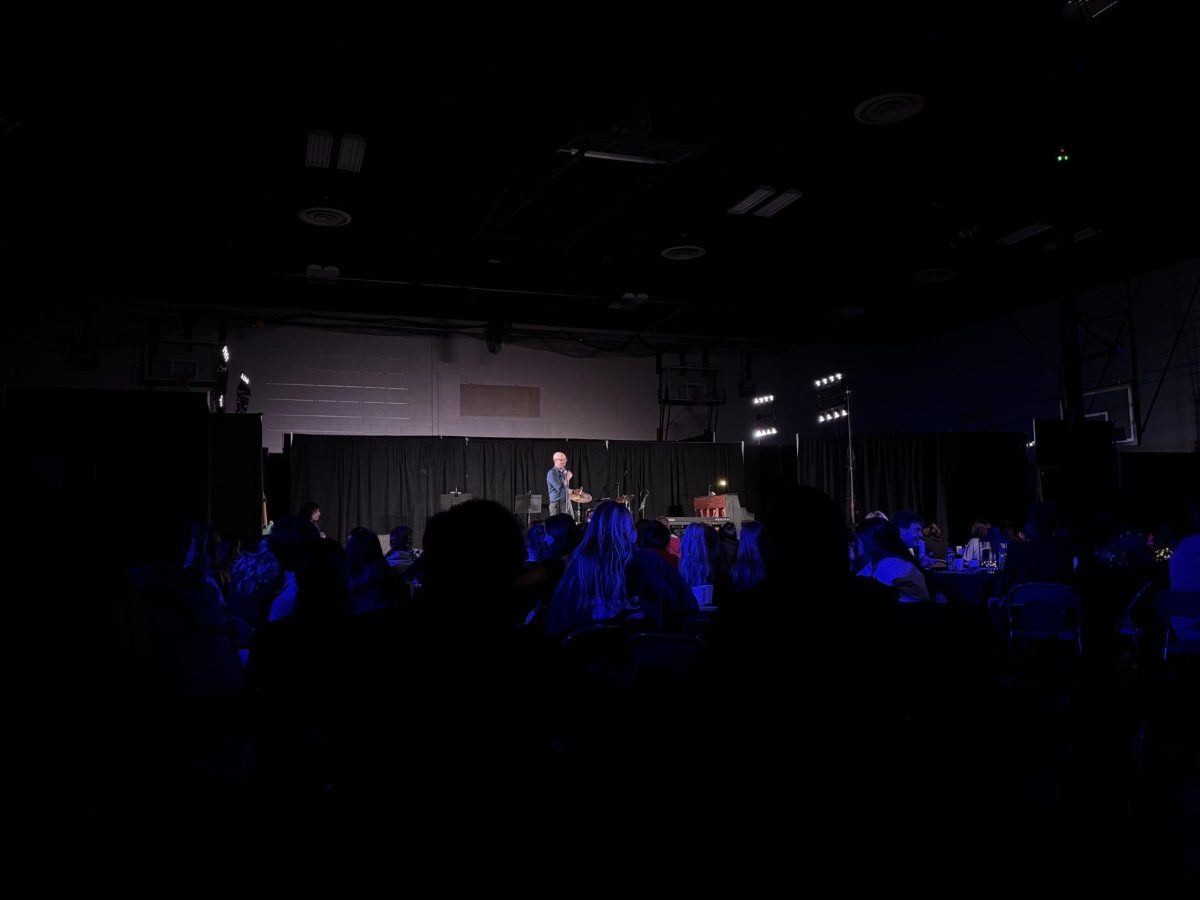Being a life-long learner is core to Dr. Sarah Davis ‘95’s career as a “tutor” at St. John’s College in New Mexico, but she traces the genesis of this love to her time as a student at Hackley. After years of forging an incredible career at St. John’s College in New Mexico and becoming a dean for the college, Davis took a step back from her work to visit her alma mater, reconnect with her roots, and see how much her high school has changed over the years.
Hackley strives to welcome alumni back to the Hilltop to create a culture that focuses on the education of students while integrating alumni into the fabric of the community. Since the beginning of the school year, 25 alumni have returned to teach classes and visit with clubs. On Tuesday, November 21, Dr. Davis had the opportunity to reconnect with her past as she returned to Hackley and spoke to students enrolled in the new Great Books Seminar course as well as to the senior class, Middle School students, and parents.
During her visit to the Hilltop, Dr. Davis spoke to families at a Hackley Parents’ Association Coffee, discussing her Hackley experience as a student and how that ultimately led to a career teaching at St. John’s. Her Chapel Talk to seniors stemmed from her obsession with the not-yet and how it relates to a book called Being in Time and the idea of time unrolling. This connects to the true but hard point that one could walk outside and get hit by a bus because one never knows at a given moment what will be and that quality of our experience, as Dr. Davis notes, is scary but also invigorating since it reveals that we are not determined.
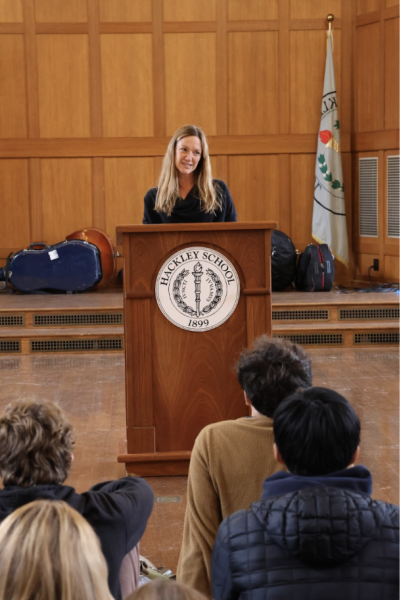
Dr. Sarah Davis visited Hackley and spoke to the Great Books Seminar course, Middle School students, seniors and Hackley families. During her talk with the seniors she traces her time at Hackley. She also encourages the seniors to embrace the indeterminate or the not-yet.
The idea that we have potentiality is what she deems fundamental to attaching meaning to our lives. She believes human beings are paradoxical and the scary aspect is that we are always trying to solve the puzzle so that we do not have to face something we do not know. She urges others to see that the not yet is the grounds for the pulse of our life and that people would be fooling themselves to figure it out and push it away instead of letting the indeterminate shine in our lives. Following her Chapel Talk, she met with Middle School students and talked to them about what philosophy “is” and what it was like as a student at Hackley in the 90s.
While on the Hilltop, Dr. Davis led a session with the students enrolled in the Great Books seminar, taught by history teacher Steve Fitzpatrick and Classics Department Chair Chris Sheppard. Senior Sam Sanders mentioned that before each class, he and his peers read a select portion of a book about philosophy, ethics, or politics including Plato, Aristotle, and Machiavelli. In class, students discuss the readings and Mr. Fitzpatrick tends to provide the political context while Mr. Sheppard offers his classics-related insights into word choice and etymology.
When Dr. Davis visited the class they met in the Whitmore Room during lunch and students prepared Plato’s “The Allegory of the Cave” beforehand. “We traded interpretations back and forth and discussed whether there is a definite, absolute, capital “T” truth as Plato asserts or whether the absence of a singular truth and the existence of complete variability is the only definite truth,” said Sam. Sam enjoyed that Dr. Davis approached the discussions from an anthropological perspective, which enriched and provided a different perspective to the discussion as well as everyone’s genuine enthusiasm.
Dr. Davis has been a professor at St. John’s College since 2012 and prior to that, worked for Time magazine in Paris and American Heritage magazine in New York. She is currently a Dean at St. John’s College in Santa Fe and was appointed in July of 2023. St. John’s College is one of the most distinctive colleges in the country due to its required Great Books curriculum where undergraduate and graduate students read more than 200 books across a plethora of subjects with faculty in small, seminar-style classes. At St. John’s, professors (“tutors”) read a breadth of texts and teach everything throughout the program.
“The idea is that we come as expert learners rather than [having] expertise in anthropology or expertise in physics. That means that you have to be put on the spot [since] learning in real time is about being vulnerable because you don’t know and have to process,” said Dr. Davis.
She had to learn Ancient Greek and teach it to the class as she was grasping the language. Additionally, the junior math course is calculus but students learn it from reading Newton’s Principia where he discovers calculus – so therein lie the questions that lead to the formulas we now take for granted.
When asked about her time as a Hornet, she shared that the peers she was surrounded by at Hackley were some of her closest friends. They were interested in sports, musicals or chorus as well as students who worked incredibly hard. This idea of balance regarding managing and excelling in extracurricular activities as well as being stellar students was an aspect of Hackley she truly valued.
“We were doing both. We were working hard and playing hard together. It is exceptional to have a high school community where you don’t have to make that choice so that felt like a gift to me,” noted Dr. Davis.
We were doing both. We were working hard and playing hard together. It is exceptional to have a high school community where you don’t have to make that choice so that felt like a gift to me
— Dr. Sarah Davis
She certainly left her mark on the Hilltop by receiving high honors certificates throughout her four years in the Upper School, obtaining the 1993-94 and 1994-95 DeWitt Wallace Scholarship, winning the Hackley Bowl for being an outstanding junior on Class Day in 1994, winning the McIlhenny Bowl, for being the outstanding female athlete her senior year. She was a superb scholar-athlete who flourished at balancing life in the classroom and the athletic field. Dave Allison was a memorable Hackley coach whom Dr. Davis was lucky enough to be guided by throughout her high school soccer career. He planted the seeds of what it means to put all of oneself into their sport along with being driven and aggressive on the field. “I think in some ways that had the most influence on me even more than my academic training in terms of working together as a group. For me in particular, Dave Allison taught me what being an effective leader was really about – leading by example, being passionate but also really hard working,” said Dr. Davis.
She reminisced that “there is something about Hackley across the board. This idea of working hard and how good that feels, I feel like I learned that there.”
As an Upper School student, she enjoyed biology and calculus courses. Particularly for calculus, she relished working hard on a problem and then arriving at a solution. Mathematics varies from biology in the sense that logic leads to a single conclusion and if one does that work, one is ultimately met with great satisfaction. She views biology as more of a narrative. She tends to regard it as a system within a living organism that does work coherently with logical reasons for why one thing follows another but it does not have the finality of a deductive proof.
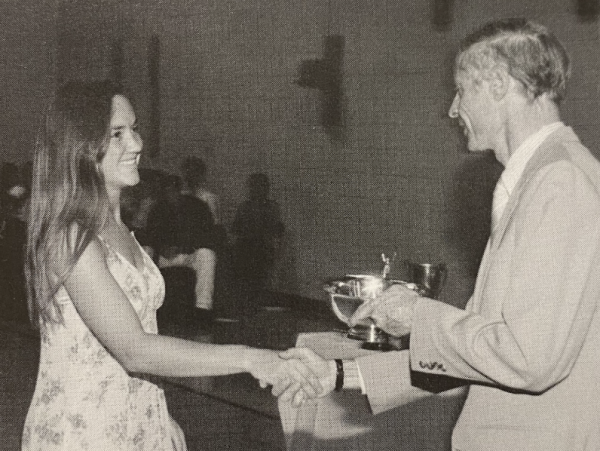
Dr. Sarah Davis was an outstanding but also a superb athlete. She received numerous awards throughout her time at Hackley during Class Day. Here, Dr. Sarah Davis received the Hackley Bowl in 1994 for being an outstanding junior for her class.
Additionally, her French class taught by Raymond Mitton was most similar to a college course because one could not conquer it given that the course centered around a foreign language where arriving at an “answer” was less concrete and more philosophical. Dr. Davis added, “It was a window into what’s coming in college and graduate school.” In her final year of French, students read literature and were being thoughtful about their arguments but it did not feel the same as arriving at a correct answer and conquering the class since it was too hard for that.
After some reflection, Dr. Davis said that as a student, she was frustrated by this because she wanted to have everything under her grasp. However, this is necessary foreshadowing for the life of a college student where the rigorous nature of the courses, and possible frustration that accompanies them is more of the norm rather than the exception.
Following her time at Hackley, Dr. Davis attended Harvard University. Initially, she did not intend to pursue philosophy given that her father was a philosophy professor but she did ultimately receive her BA in anthropology and philosophy. Her core course on moral reasoning, which examined public and private life, enticed her and changed her trajectory.
She added that, “despite yourself, your interests reveal themselves to you.” She was interested in human nature which correlates to biology as well as the philosophy side of what it means to be a human being and how human nature can be viewed. Her desire to understand human nature and her fascination with the texture of the differences between cultures guided her to shift from studying art history and philosophy to anthropology and philosophy.
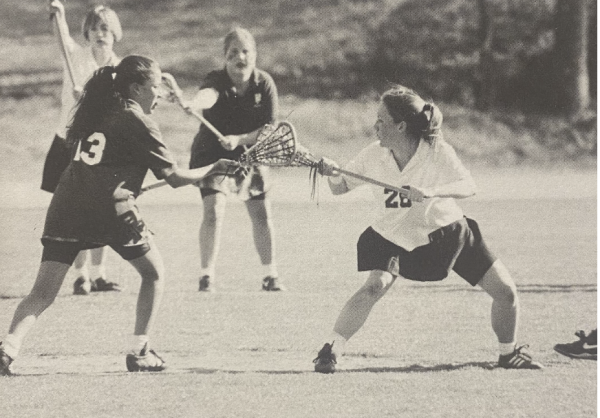
Dr. Davis was not only a distinguished student at Hackley. She enjoyed playing sports, particularly being under the leadership of Dave Allison for soccer. At Hackley she was an integral part of the soccer and lacrosse teams.
At Harvard, there were large lecture classes coupled with something termed “sections” led by teaching assistants that included discussions of the current reading. When viewing Harvard alongside St. John’s, Dr. Davis stated that “there was a lot of competition at Harvard. We called them “section talkers;” there were people who came in to show what [they] knew and it felt like people vying to be the voice in the room that determined how people were thinking about things. It’s not surprising that it’s a very competitive environment.”
In contrast, St. John’s professors work to build a conversation together with the goal of focusing on the text and thinking collectively about what it is saying. It takes students about half a year to adjust to this new mindset because a St. John’s seminar is not about saying something smart and “winning” the conversation. She really loved her time at Harvard and noted that the conversations she had with her friends at the dining hall were more like the St. John’s seminar style classes.
After Harvard, Dr. Davis attended Emory University and received a doctorate in cultural anthropology. She eventually arrived at St. John’s College in Sante Fe, New Mexico where she currently works.
Elaborating on the fabric of how St. John’s is structured, Dr. Davis said, “It brings together the satisfaction of the Hackley classroom where there are these intellectual processes that wrap things up and make sense of the world in such a satisfying way. It brings that together with philosophical questions of what does it mean that we can’t find the area under a curve the way we would for the area of a rectangle? What is it about the world that has this continuum character that can’t quite fit into our rigid, atomistic modes of mathematical reckoning?”
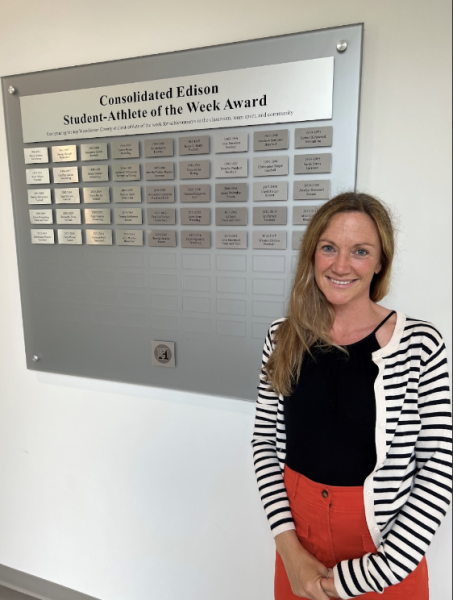
When Dr. Davis visited the Hilltop, she not only spoke to members of the Hackley community but also received a tour of the school. She visited the Johnson Center for Health and Wellness. She also stood in front of the Consolidated Edison Student-Athlete of the Week Award which she was an honoree.
She particularly loves philosophy and it comes more naturally to her but when she reaches towards science and math she has to work to “put the philosophical together with the technical.” But she said it is seminal for students to see what it looks like to face a body of work that can be more complicated or nuanced than expected and then persevere through it with the help of others.
When asked about a particular discussion that was noteworthy at St. John’s, she reflected on Freud and his imagery of the subconscious and the architectural image of a waiting room where it divides the conscious and subconscious. Her class jokingly calls him the “bouncer” because he determines who comes in and out. They proceeded to draw this image on the board and the real question was whoever this bouncer was, who let thoughts come from the subconscious and travel into the consciousness, who was that and who is the one that makes the decision? This was the beginning of a wonderful conversation that has left an imprint on her mind. But overall, every class has an engaging question that students wrestle with and still are persistent, living questions.
When thinking about how people can embrace the indeterminate, she immediately thought of St. John’s because the sense of the classroom is that one would not want to pin it down but rather live and work with ideas to make one flourish. So she encourages people to engage in the projects they are completing at St. John’s: “If you are working daily with fellow students to think about really hard questions in a way that feels both productive but doesn’t have the character of finality, you start to understand what living that way looks like because it wouldn’t occur to you to have to solve Plato to feel like you have grown from Plato. That would be too hard since there is a universe of meaning in each of his books,” said Dr. Davis.
If you are working daily with fellow students to think about really hard questions in a way that feels both productive but doesn’t have the character of finality, you start to understand what living that way looks like because it wouldn’t occur to you to have to solve Plato to feel like you have grown from Plato. That would be too hard since there is a universe of meaning in each of his books
— Dr. Sarah Davis
She adds that grasping the idea of the indeterminate is indeed a shift in orientation. So much of society is driven towards goals that it will take work to adjust one’s mindset. She encourages people to take seriously the moments where they feel pulled out of themselves and treat that as a guide to think about the moments where they have not just fulfilled a task but actually feel elevated. She thinks that this is connected to being at the edge and living with the indeterminacy without letting it scare one too much. Thus, she recommends paying attention to those inner stirrings as well as asking ourselves which areas of our life this occurs the most and guiding ourselves towards them.
As this is her first time as a dean at St. John’s, Dr. Davis reflects on the dichotomy between balancing intellectual and family life. She recognizes it is hard and that she has not found a complete answer but does not separate what it means to read a philosophical text well and what it means to live her life well. She enjoys reading to her children and playing soccer with them so she believes there is an intersection between living deeply and in the present and that she is her best self when all of those pieces coincide. She also hopes to think philosophically about motherhood as well because this is another aspect of her identity.
Dr. Davis’ visit enabled members of the Hackley community the chance to see the good in wrestling with complicated ideas and embracing them, rather than trying to always feel the urge to solve the complex puzzles of life. Hackley is honored that Dr. Davis took time out of her busy schedule to travel to her educational roots and grant current students the opportunity to take a look at the life of a distinguished, well-accomplished alumna. I truly enjoyed learning about how Dr. Davis grapples with large questions that may not always have answers, as well as unpacking her career path that centers around many disciplines and has led to her forging an incredible life.

